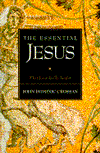
I've no doubt that John Dominic Crossan will enter the Kingdom of Heaven before many who see themselves as good Christians; anyone who wrestles with Christ as much as he deserves a free pass. But it won't be on the strength of his theology.
In this slim book, Crossan asks us to focus on Jesus's "program", which included a healthy dose of criticism of the current world order. Crossan goes as far as to re-translate (I would suggest "rewrite") a number of Jesus's sayings to fit his thesis. "The Son of Man has nowhere to lay his head" becomes "Only humans are homeless"; "Blessed are the poor" becomes "Only the destitute are blameless." Crossan's idea is to deliberately heighten the "kingdom" aspects of Christ's sayings, stripping away the sugary accretions of later ages for the pith he imagines were Christ's original words.
There is value to this exercise. But also danger. The kingdom that Christ proclaimed is not completely congruent with the idea of heaven that many Christians accept. But to equate it with a here-and-now critique of 1st century economics seems equally absurd. Crossan also denies the apocalyptic aspects of Christ's preaching in favor of a "sapiential" eschatology that focuses on the presence of the Kingdom in the present. Yet one need not hold a doctorate in theology to recall the many instances when Christ spoke of an ultimate time of final judgment. Crossan ignores these sayings.
"The Essential Jesus" contains a couple dozen images of Christ from the early centuries of Christianity, which Crossan deploys to make his case that Jesus's "program" was centered on healing and meal commensality. These black-and-white images are of middling quality and spread throughout the book, but explained in a hard-to-find appendix in the back of the book. The middle section contains Crossan's rewritten versions of Jesus's sayings, one to a page, making the slim volume even leaner. Crossan's explanations for these sayings is also found in the back, which makes reading the book tedious and confusing.
Still, there's (accidental) value in the book. By focusing so much on the kingdom, Crossan brings attention to an all-but-neglected aspect of Jesus's teaching. And his interpretation of Christ's parables provide insights into their meaning that don't always come from more conventional writers. To see a mustard plant as an aggressive and uncontrollable weed gives new insights into what Jesus was talking about when he compared the Kingdom to a seed of that plant.
In the old Superman comics, the Man of Steel visited a strange planet where a lived "bizarro" version of himself. Bizarro Superman was strange inversion of the real Superman -- his face was bleached and craggy and his speech was brain-damaged. The Jesus that Crossan presents is just as strange, representing an extreme edge of the fully-limned (if dificult to understand) portrait Jesus of the Gospels. It's sad that a man of Crossan's obvious intellect and passion goes to such lengths to fashion a Christ that is so evidently made in his own image.

No comments:
Post a Comment